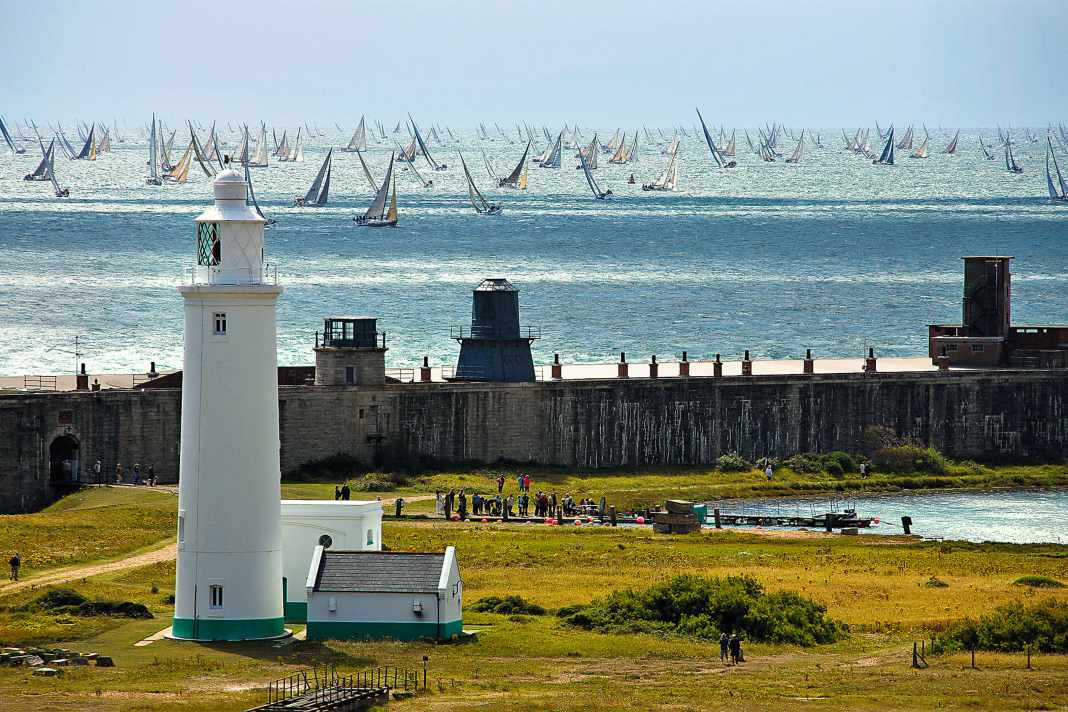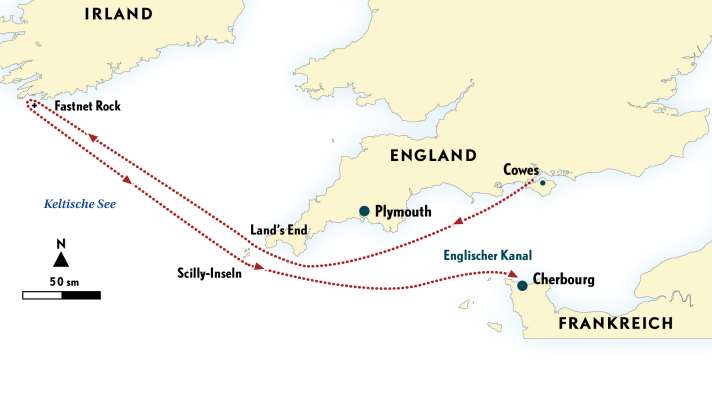





The Admiral's Cup was last lifted into the sky above the Isle of White in southern England by Australian winners 22 years ago. Since then, the battle for the gold trophy has been on hold. The last German victory in the unofficial sailing world championship was 32 years ago. Offshore giants Hans-Otto Schümann, Willi Illbruck and Udo Schütz won with three Judel/Vrolijk masterpieces: the one-tonne world champion "Pinta", the two-tonner "Rubin VII" and the 50-foot racer "Container".
In 1993, they wrote the final chapter of success for the time being in the black, red and gold love story that has linked Germany's sailors with the Admiral's Cup, which was first held in 1957, for decades. The last GER victory after 1973, 1983 and 1985 came by a quarter of a point ahead of Australia. In stormy winds, the German trio prevailed in the demolition derby, while the favourites from Italy and Australia paid dearly for collisions and breakages.
We have summarised the most important events at the Admiral's Cup compiled here.
Legends of sea sailing
Even back then, the Admiral's Cup was always a star parade of its time: five-time America's Cup winner and current SailGP conductor Russell Coutts was one of the helmsmen on "Pinta" alongside FD Olympic champion Jörg Diesch in 1993. Diesch said of the Fastnet storm race: "In the Solent, we sailed as hard as if the regatta only lasted one hour and not three days." In the final Fastnet sprint, the wind in Plymouth Bay roared at 25 knots and more. There was thick fog. Diesch experienced it like this: "I was standing at the tiller and was completely disorientated. We could barely see the top of our own mast, let alone hold our course properly."
Russell Coutts was in the "Pinta" cockpit for the last few nautical miles, pumping the mainsail with every wave. Diesch remembers: "In the early morning, it was Russell and his watch that sent the 'Pinta' racing across the finish line at a speed record of 10.98 knots." That was worth the Fastnet class win after an adjusted early start. The "Container" and "Rubin VII" had previously finished fourth in their respective Fastnet classes in the evening and during the night.
At that point, there was no more than a hint of hope of winning the Cup. On land, however, Willi Illbruck and Hans-Otto Schümann did not give up. They didn't sleep a wink that night, sitting at sparse plastic tables in the deserted press office, busily scribbling columns of figures on paper and holding out. Until the sensational Cup coup the next morning.
Efficient Team Germany, dramas at the competition
In the British media at the time, it was said that the German success was down to the efficiency of the team and its Shore crew, who were ready for anything. Just like Gunnar Knierim and his team-mates, who rebuilt the torn-off "Pinta" keel shoe in a night-time tour de force with a great deal of creativity and boat-building skill, making it safe to measure and in time for the next race.
The highly rated competitors were less fortunate: Harald Cudmore's "Jameson 1" hit a rock at full speed and sank spectacularly. A dramatic one-million-dollar crash between the Italian "Mandrake" and the Dutch "Pro-Motion" robbed the Azzurri of their dreams of victory. After a "collective blackout" by the crew, the entire bow of the "Mandrake" tore off. The hole in "Pro-Motion's" side was the size of a man. In the end, the Italians plummeted with the "Larouge" mast breakage in the Fastnet Race.
The record holders 68 years after the Admiral's Cup premiere are the hosts with nine victories ahead of Germany. They are followed by the USA and Australia with two wins each.
The revival of the Admiral's Cup
After several failed attempts to revitalise the event, the tenacious host Royal Ocean Racing Club is now steering a proud fleet of 15 teams the new start. A radical refit brought the breakthrough: two boats form a team instead of three as in the past. The nation rule has been relaxed: the duos can start for countries, clubs or across nations under their own chosen team umbrella. The strongest response comes from Germany: six boats in three teams will be racing in the Solent.
The Germans at the Admiral's Cup
A look at the young "Red Bandit" crew in particular shows how times have changed. Team co-manager Moriz Forster has just turned 24. He was born eight years after the last German Cup victory. His father Carl-Peter Forster has linked the ambitious offshore project with the Forstar Offshore Racing Foundation, which builds bridges for young sailors from dinghy racing to sea sailing. Even before the "Red Bandits" won the Rolex Middle Sea Race 2024, it was clear that the idea, concept and crew had great potential - and that also applies to their two-boat team in the Admiral's Cup.
With Dirk Clasen's "Ginkgo", the Bandits are the most potent of the three German Cup duos on paper. Which violin could they play in the Admiral's Cup concert? Moriz Forster says: "It's difficult to predict. Our favourite position is that of the underdog. We've often been underestimated." Since their triumph in the Middle Sea Race, however, the professional competition has had the youngsters on its radar.
Moriz Forster muses: "They always say that series like this are won inshore and lost offshore. My hope is a little bit that we might be top five offshore. The inshore part will be challenging, where others are faster than us on the water."
The format of the Admiral's Cup
The Channel Race, a series of short races and the Rolex Fastnet Race make up the varied Cup sports programme. As so often in the past, performance in the triple-judged Fastnet endurance stage will have a decisive impact on the final result in the Cup comeback. Moriz Forster explains an important aspect of the preparations: "We have improved our front and done a lot to make the boat watertight. There were spots in the boat with delamination. We have now found every spot where the carbon showed weakness. The hull should be stable."
The intensive preparatory work required is confirmed by "Ginkgo" skipper Dirk Clasen. The 60-year-old owner and managing director of a tree nursery in the green outskirts of Hamburg is also taking a family approach to the Admiral's Cup project. Together with his wife Antje and son Jacob Clasen, who studied yacht and powercraft design in Southampton and works at Artemis Technologies in Belfast, the skipper forms the central family trio in the nine-strong "Ginkgo" crew.
They "snapped up" their boat from previous owner and Oyster founder Richard Matthews in 2018 "as a young second-hand boat". The Clasen crew already competed in a Rolex Fastnet Race in 2023 with the 2016-built Humphreys 39, leading their competitive group at times and impressively demonstrating their potential with fifth place.
The sailing paradise of Cowes
Everyone is looking forward to immersing themselves in the sailing Eden of Cowes. "When you walk through the town, there doesn't even have to be an event. It lives like that too. There are people walking around in work shoes and shorts - pure sailing life. It was similar in the Hamburg marina in Wedel when Schmiddel was still there," says Dirk Clasen.
The young Moriz Forster, who grew up partly in the UK, says: "I don't know of any place in the world that is so connected to sailing. In Cowes, Hamble and the Solent, you can see everywhere that sailing and regatta sport originated here. People go out here in rain and storms with a triple reefed main and have fun. I'm a big fan."
Dirk Clasen sees participation in the Admiral's Cup as an extraordinary opportunity: "I see it as a unique opportunity to be able to take part in such a traditional series with a manageable budget. For us, this is the Mount Everest of sailing, an eight-thousander." The German challengers approach the legendary and challenging tidal area with respect, but without fear. "It's not really voodoo. If you come from the Elbe, you can sail around sandbanks," says Clasen with a smile.
The decisions are made in the Rolex Fastnet Race
He has been sailing since he was five years old. His parents had a Warship 725, and North Sea Weeks with Cup competitions were the annual Whitsun highlight of his childhood. Now, like the other five German crews in three teams, the Clasen family is looking forward to the rebirth of the Admiral's Cup with great anticipation and serious ambition.
The top favourites may be Karl Kwok's subscription world champion "Beau Geste" and her little sister "Beau Ideal" from Hong Kong or other hard-to-estimate teams with at least one rocket each. However, the German sailors are determined to make their mark on the 24th Admiral's Cup in the races from 19 to 31 July. And it will be the same as always: The decisions will be made in the Fastnet Race.


